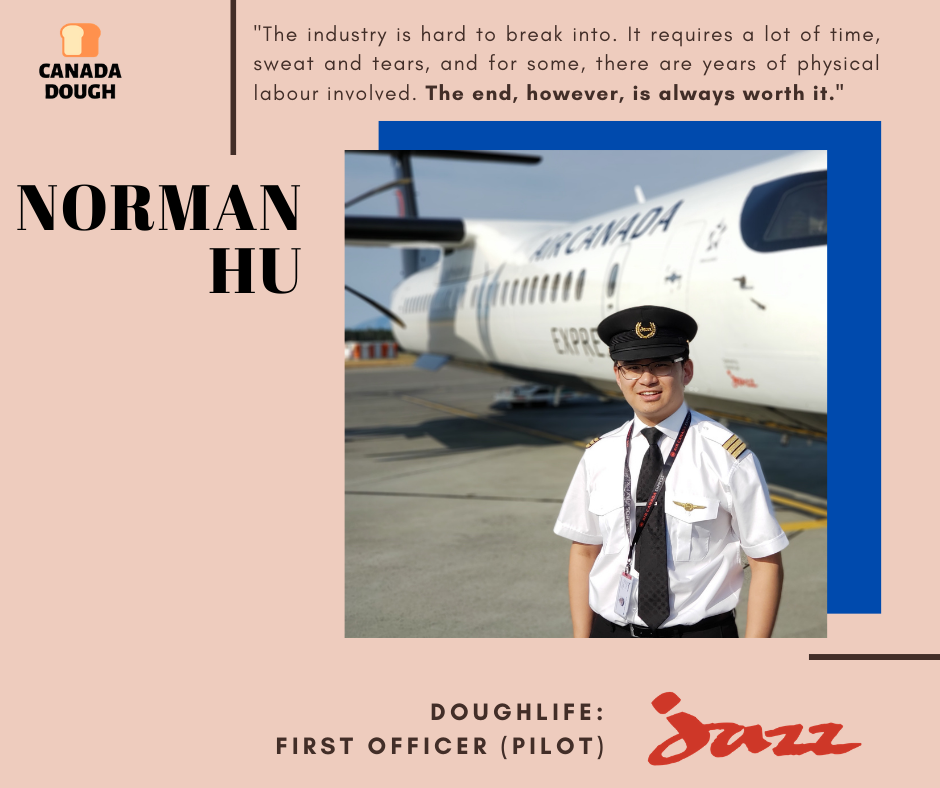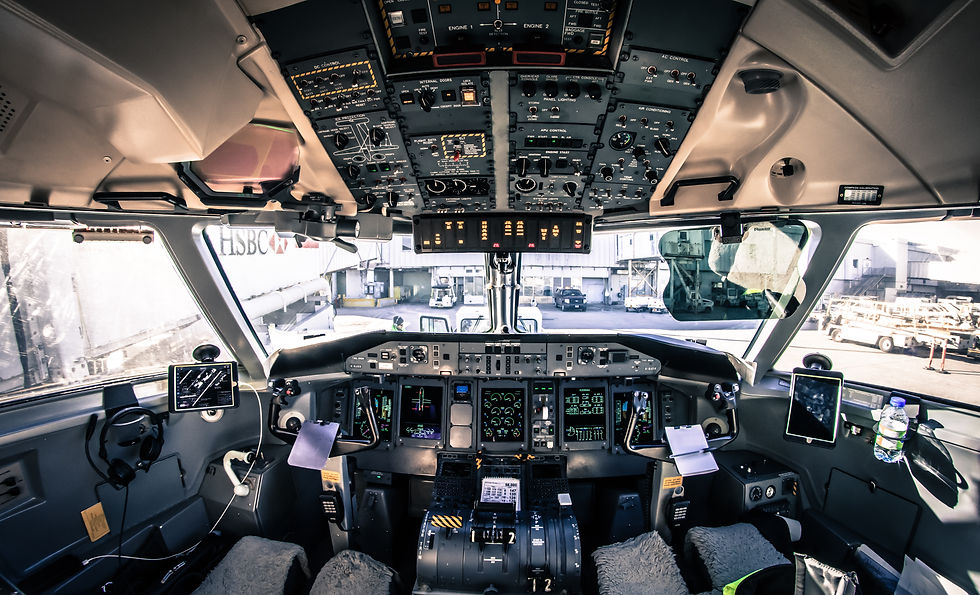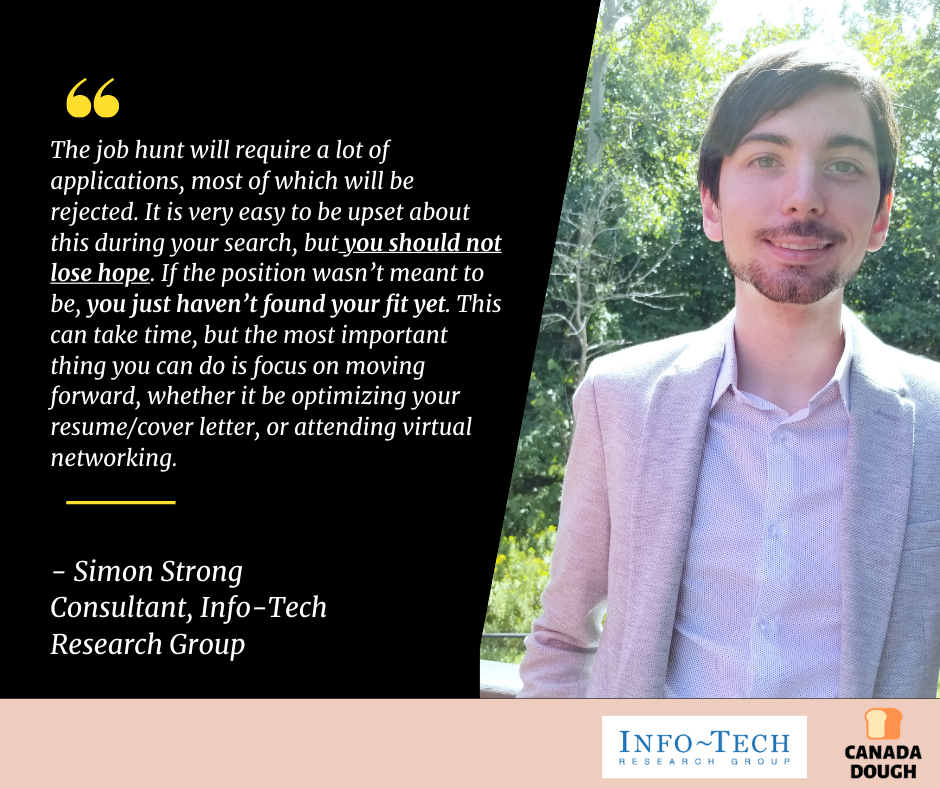DOUGHLIFE: A Day in the Life of a First Officer
- Canada Dough

- Nov 17, 2020
- 6 min read
Name: Norman Hu
Role: First Officer at Jazz Aviation LP

About Me
Hello everyone! My name is Norman Hu. I work as a First Officer for Jazz Aviation, operating the Bombardier Q400 based out of Toronto.
I graduated from the University of Waterloo in 2018, with an Honours Bachelor in Geography and Aviation and specializing in Geomatics. Prior to this, I worked as a Flight Instructor at the Waterloo-Wellington Flight Centre for a bit over a year.
Why do I like this role? I like this role because every day presents new challenges. The environment is constantly evolving and does not involve sitting on a cubicle for long hours. Layovers are also interesting as I get to explore a lot of cities as part of work. I have had the opportunity to travel to every major city in Canada as well as several destinations in the United States.
1. What is your role? What does your job entail?
A First Officer is essentially the second-in-command of an aircraft, after the Captain. It would be what the public think of as “the co-pilot.” A common misconception is that only the Captain of the aircraft flies the plane when this cannot be further from the truth. Both the Captain and First Officer fly the aircraft, taking turns as one physically flies while the other controls all other aspects. Other aspects include monitoring parameters, flipping switches and communicating with air traffic control. The only key difference between the two, is that a Captain has final authority in making executive decisions. A First Officer facilitates in that process and also has the authority to override decisions if required. Flying an airplane is the easy part. The difficulty comes with the many decisions’ factors (e.g. Can we make that landing on time or do we have to go around? Will the weather delay the flight? Is the passenger weight distribution proper for take of?) and teamwork required to get people safely from Point A to B.
2. What does a typical day look like for you? How is your work-life balance?
A typical workday involves reporting to the airport and starting the day with the rest of the crew members, discussing any relevant information to the flights that are to be operated that day. This includes, but is not limited to, weather, safety concerns, possible delays, as well as any relevant operational procedures. Aircraft checks are completed as passengers are boarded, and when everything is completed, we push back from the gate (hopefully on time!) and we are on our way! The process repeats itself several times during the day, and we end off either back at our home base or at another city for a layover where we stay at a hotel for the night.

Photo by Norman Hu. Location: Near Crowsnest Pass and Calgary
3. What appealed to you about this particular organization?
The company I work for is Jazz Aviation LP. It is one of the largest regional airlines in Canada. We operate short-haul flights on behalf of Air Canada and essentially run feeder networks for their larger aircraft. The company really appealed to me with its culture of safety. Concerns are taken very seriously. When incidents occur, the route for resolving issues is not finding someone to blame, but rather to find factors on what caused certain incidents and how to prevent them. It creates a culture where people are open to reporting incidents and mistakes, rather than hide them and have someone else repeat it. As one of the biggest regional airlines in the country, doing short-haul feeder flights for Air Canada, there is also some sense of stability in an otherwise relatively turbulent industry.
4. What aspects of your job do you enjoy? What keeps you up at night?
I thoroughly enjoy being in such a niche specialized field and just straight up loving my job every single day. The teamwork that gets involved behind the scenes and learning to work with different people. This was a job I have always wanted to do ever since I was a kid. Not to mention, travelling is essentially part of the job! Unfortunately, the nature of this job also means that I am always either away from home, or I am working odd hours and weekends/holidays. Your schedule is completely dependent on a seniority-based system. In addition, the industry is quite susceptible to downturns. Case in point, COVID-19 has left me on temporary leave as travel has been reduced significantly.

Photo by Norman Hu. Bombardier Q400 - Jazz Aviation LP.
RECRUITMENT PROCESS
5. What would the ideal candidate look like? Describe any relevant skills, experiences, traits, etc.
The ideal candidate would be someone who can work with others, and also demonstrate the ability to be worked with. Aviation on a professional level is a field where egos need to be dropped. The cockpit in an airline is an environment where teamwork is extremely crucial. I have seen many talented pilots who have been denied the opportunity because they have shown that they are either not the most pleasant to work with or had traits that would not contribute to a team-based environment. The candidate would also need to demonstrate a willingness to learn, as every company has its own standard operating procedures of aircraft that differ greatly from one another. The ability to physically fly a plane is only part of the equation of the application.
6. What did the application/interview process look like for you? How did you get your foot in the door?
The interview was a two-step process. The first step is a behavioural and situational based in-person interview; the questions are targeted to give the interviewers an idea of how the person works in a team as well as how she/he reacts in certain situations (i.e, name a time you did this/that). If the first step was successful, then the applicant proceeds to conduct what is known as a simulator evaluation. The applicant is given an hour to study abbreviated procedures, and is then placed into a large flight simulator with physical controls where they would fly with an experienced captain. The objective here is to evaluate the applicant’s flying skills, ability to learn and the capability to work with someone they have never met.
For someone to enter the field, they usually require at least a few years of experience and a few thousand hours of flying at a smaller airline. However, Jazz had an agreement with certain universities and colleges where they would intake a small number of top students directly into the airline. I was one of the lucky few who was presented with that option.
7. How did you stand out in the application process?
Work ethic and attitude are competencies that are highly sought after, and I believe this made me stand out against other applicants. I managed to complete most of my studies within 3 years in a 4-year program, and held a full time flying position prior to graduation. Of course, that’s not a feasible expectation out of everyone, but one needs to show the willingness to learn and be humble. Applications for flying positions in aviation is unlike most other fields as it is dominated by hard numbers. Once an applicant reaches a certain amount of flight hours, they are eligible to apply. As such, standing out requires numerous soft skills to help compliment the numbers.

Photo by Norman Hu. Location: Cockpit of the Bombardier Q400 - Jazz Aviation LP.
8. Looking back, was there anything you could have improved during your application process, or mistakes that you noticed other applicants had made?
As mentioned earlier, flying skills is only one part of the equation. The ability to work with others is as equally important. I have seen people disregard that. It takes more than one person to fly an airplane of this scale. In aviation, there is a principle called “one crew concept.” The safe operation of a flight is dependent on the coordination of the Captain, First Officer, and the flight attendants working together in equally important roles. There have been applicants who failed to see this.
I did notice that my communication skills were not up to par initially. I had trouble articulating my thoughts during the initial interview process and during the first bit of training. Having the ability to do so would have made everything a lot smoother.
9. Were there any surprises in your job search experience or things you wished you had known earlier?
There is an expectation that you would need to move away from home as a pilot. I did not know this prior to starting education in this field and only learned when I started school. This is something that people need to expect. It was certainly harder than I would’ve expected initially given I was thinking about settling down. Work schedules were also based on seniority, and seniority does not transfer from one company to another.
10. What advice would you give to someone who wants to break into your role/program?
The industry is hard to break into. It requires a lot of time, sweat and tears, and for some, there are years of physical labour involved. The end, however, is always worth it. There will also be ups and downs in the industry, such as now given the COVID-19 situation. We went from a significant pilot shortage in the industry to a surplus in the span of a month. Be sure to plan for that so you can ride it out. The positives always outweigh the negatives. This is also a niche field where everyone knows each other. Be sure to always carry a professional image as word gets around quick.




Comments